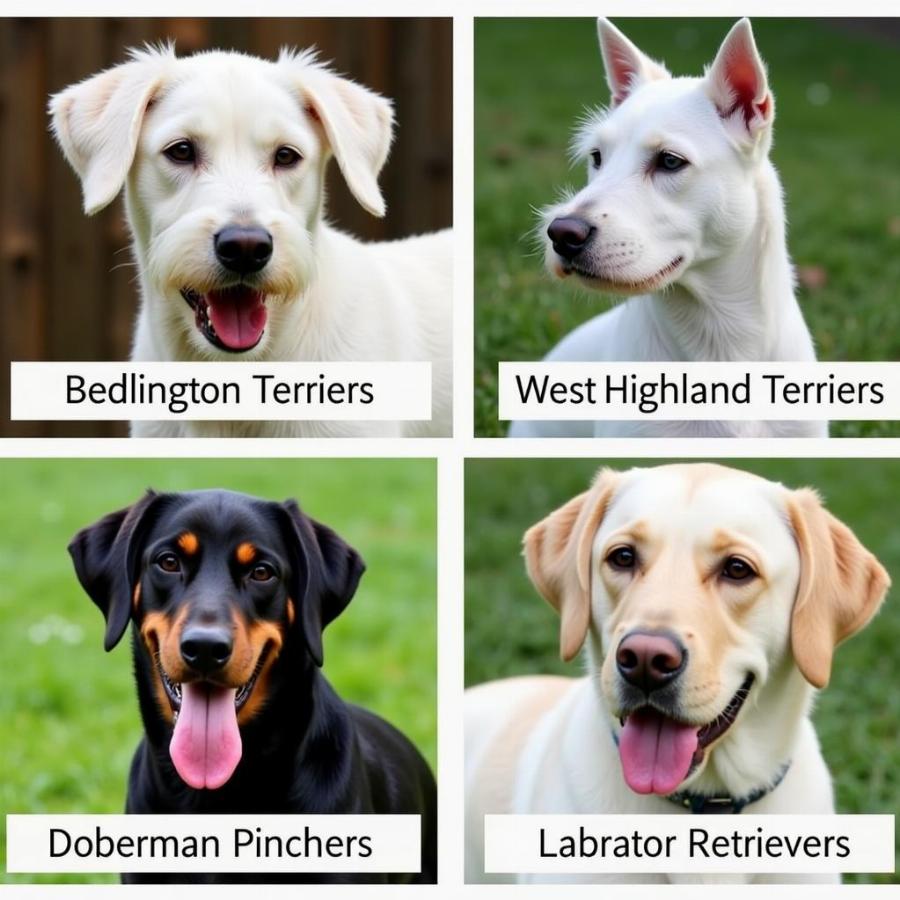Low copper dog food is a specialized diet formulated for dogs with specific health conditions, particularly copper storage diseases. While copper is an essential nutrient for all dogs, excessive accumulation can lead to serious health issues, especially liver damage. This article delves into the intricacies of low copper dog food, its importance, and how it can benefit your furry companion.
What is Low Copper Dog Food and Why is it Important?
Just like humans, dogs require a balanced diet with essential vitamins and minerals, including copper. Copper plays a vital role in various bodily functions like red blood cell formation, iron absorption, and maintaining healthy bones, blood vessels, and nerves. However, certain dog breeds are genetically predisposed to copper storage diseases, where their bodies absorb and store excessive copper, primarily in the liver. This buildup can lead to inflammation, scarring, and ultimately, liver failure.
Low copper dog food addresses this issue by significantly reducing the amount of copper in the diet. By limiting copper intake, these specialized foods help prevent further copper accumulation in the liver, manage the disease, and alleviate its symptoms.
Which Dog Breeds Benefit from Low Copper Dog Food?
While any dog can develop copper storage disease, some breeds are genetically more susceptible than others. These include:
- Bedlington Terriers: This breed is particularly prone to copper storage disease, with a genetic predisposition making them highly efficient at absorbing copper.
- West Highland White Terriers: While not as common as in Bedlington Terriers, copper accumulation can still be a concern for Westies.
- Doberman Pinschers: This breed, specifically males, shows a higher risk of developing copper-associated hepatitis.
- Labrador Retrievers: Labradors, particularly females, are also known to be at risk for copper storage disease.
 Dog Breeds Prone to Copper Storage Disease
Dog Breeds Prone to Copper Storage Disease
Choosing the Right Low Copper Dog Food: Factors to Consider
Selecting the right low copper dog food is crucial for managing your dog’s health. Here are key factors to consider:
1. AAFCO Statement: Always choose a food with the Association of American Feed Control Officials (AAFCO) statement on the label, ensuring it’s complete and balanced for your dog’s life stage.
2. Copper Content: Opt for food with a copper content below 8-10 mg/kg dry matter. Consult your veterinarian to determine the appropriate copper level for your dog’s specific needs.
3. Ingredient Quality: Look for high-quality protein sources like meat, poultry, or fish listed as the first few ingredients. Avoid artificial colors, flavors, and preservatives.
4. Digestibility: Choose highly digestible food to maximize nutrient absorption, especially important for dogs with compromised liver function.
5. Your Veterinarian’s Recommendation: Always consult your vet before switching your dog to a low copper diet. They can assess your dog’s individual needs and recommend the most suitable food.
Transitioning to Low Copper Dog Food: A Gradual Approach
When transitioning your dog to a low copper diet, it’s crucial to do so gradually to avoid digestive upset. Start by mixing a small amount of the new food with your dog’s current food, gradually increasing the ratio over 7-10 days until they are fully transitioned.
Living Well with Low Copper Dog Food
Feeding your dog a low copper diet can significantly improve their quality of life, especially if they are prone to copper storage disease.
“Low copper dog food isn’t just about restricting a mineral; it’s about providing a lifeline for dogs genetically predisposed to copper storage issues. It allows them to thrive without the looming threat of liver disease,” says Dr. Emily Carter, a veterinary nutritionist with over 15 years of experience.
Remember, early diagnosis and dietary management are crucial for preventing irreversible liver damage. Regular veterinary checkups, blood tests to monitor copper levels, and a well-chosen low copper diet can significantly improve the long-term health and happiness of your beloved companion.
FAQs about Low Copper Dog Food:
1. Can I feed my dog a homemade low copper diet?
While it’s possible to formulate a homemade diet, it’s challenging to ensure it’s completely balanced and provides all the essential nutrients in the right proportions. Consulting a veterinary nutritionist is highly recommended.
2. Are there any side effects of feeding low copper dog food?
Low copper dog food is generally safe when fed as directed by a veterinarian. However, in rare cases, dogs might experience mild digestive issues during the initial transition period.
3. Can I switch back to regular dog food after my dog recovers?
It’s not recommended to switch back to regular dog food, especially for breeds genetically prone to copper storage disease. The risk of copper accumulation remains, and continuous monitoring is crucial.
4. How can I make low copper dog food more appealing to my picky eater?
Adding warm water, bone broth (low in sodium), or mixing in a small amount of wet low copper dog food can make the food more palatable.
5. Where can I buy low copper dog food?
Low copper dog food is typically available through veterinary clinics or reputable online pet food retailers.
Beyond Low Copper Dog Food: Other Important Considerations
While diet plays a significant role in managing copper storage disease, it’s crucial to remember other aspects of your dog’s overall well-being.
- Regular exercise is essential for maintaining a healthy weight and supporting liver function.
- Provide plenty of fresh water to aid in digestion and detoxification.
- Minimize stress: Stress can exacerbate health issues, so creating a calm and comfortable environment for your dog is vital.
Beaut Dogs: Your Trusted Source for Dog Care Information
Beaut Dogs is your one-stop resource for all things dog-related, providing reliable and insightful information to help you provide the best possible care for your canine companion. For personalized advice and guidance on low copper dog food and managing your dog’s health, reach out to our team at [email protected]. We’re here to help you navigate the world of dog ownership with confidence and care.